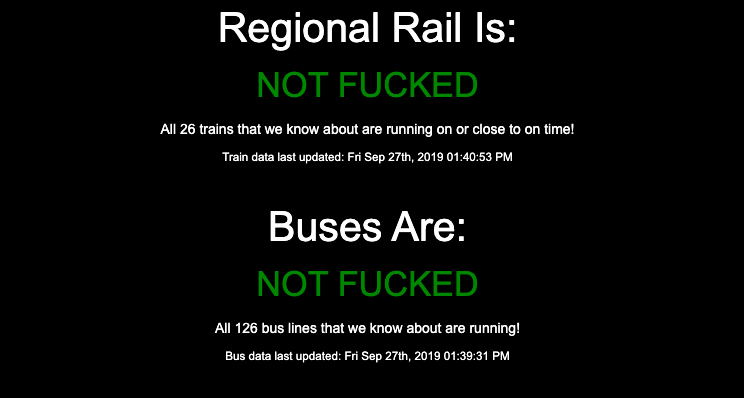For Technical.ly’s 10-year anniversary, we’re diving deep into the archives for nostalgic, funny or noteworthy updates. This is part of a year-long series.
At 1:42 p.m. on Friday, Sept. 27, 2019, SEPTA Regional Rail and buses were officially not fucked.
It was surely a relief to Philadelphia commuters who rely on those specific services, especially those who have seen how the efficiency of public transportation on beautiful sunny afternoons contrasts with that of winter days, when snowstorms can send the beloved Is SEPTA Fucked? website into “Turbo Fucked” status.
Ardmore’s Doug Muth has been confronting SEPTA tardiness via the irreverent site for almost exactly seven years: Technical.ly first reported on it Sept. 26, 2012.
How has the project, which is built with Node.js running the Express Webserver on Heroku, changed in that time?
“The two main changes were making the website mobile friendly, and adding the infamous ‘Turbo Fucked’ status,” Muth wrote in an email.
He’s also been archiving all the site’s data, on view here, and created SeptaStats.com — “a more professional concept” — to store train data for every individual train, line and station.
“Currently, I have 60 million pieces of train data going back 4 years,” he said. “Every train, every minute, how late it is, the next station, and its lat/lon coordinates.”
One recent notable traffic day was Wednesday, Aug. 7, when severe thunderstorms threw SEPTA’s automated communications systems into flux. Muth said Is SEPTA Fucked? saw more than 1,000 visitors that day.
And while he’s received positive feedback from users, there’s one stakeholder he hasn’t heard from: the Southeastern Pennsylvania Transportation Authority itself.
“I thought about bringing this up with SEPTA in the past,” Muth said, “but it seemed to me that going up to them and saying, ‘Hey, I built this website with your agency’s name and the word “fucked” in it, wanna see?’ would be … kind of a dick move on my part.”
When he’s not tracking transportation, Muth works on various data projects to solve “everyday problems,” including these (with provided descriptions):
- Diceware —This app lets you generate passwords you can actually remember, using a browser-based version of the Diceware technique.
- Splunk Network Health Check — A Docker app which spins up an instance of Splunk to test your network in real-time. Useful for when dealing with bad hotel internet.
- Splunk Lab — Lets you stand up a Splunk instance inside of Docker in seconds, complete with a number of apps and data sources built in, including Splunk’s machine learning app. “Once that was written, I went on to Splunk Yelp reviews, Glassdoor reviews, Telegram chat groups, and my FitBit data,” he said.
Join our growing Slack community
Join 5,000 tech professionals and entrepreneurs in our community Slack today!
Donate to the Journalism Fund
Your support powers our independent journalism. Unlike most business-media outlets, we don’t have a paywall. Instead, we count on your personal and organizational contributions.

National AI safety group and CHIPS for America at risk with latest Trump administration firings

Immigration-focused AI chatbot wins $2,500 from Temple University to go from idea to action

How women can succeed in male-dominated trades like robotics, according to one worker who’s done it


